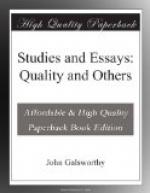We set to work, slowly at first, then faster and still faster, bringing in true bills; and after every one making a mark in our lists so that we might know where we were. We brought in true bills for burglary, and false pretences, larceny, and fraud; we brought them in for manslaughter, rape, and arson. When we had ten or so, two of us would get up and bear them away down to the Court below and lay them before the Judge. “Thank you, gentlemen!” he would say, or words to that effect; and we would go up again, and go on bringing in true bills. I noticed that at the evidence of each fresh bill we looked with a little less excitement, and a little less solemnity, making every time a shorter tick and a shorter note in the margin of our lists. All the bills we had—fifty-seven—we brought in true. And the morning and the afternoon made that day, till we rested and went to our homes.
Next day we were all back in our places at the appointed hour, and, not greeting each other much, at once began to bring in bills. We brought them in, not quite so fast, as though some lurking megrim, some microbe of dissatisfaction with ourselves was at work within us. It was as if we wanted to throw one out, as if we felt our work too perfect. And presently it came. A case of defrauding one Sophie Liebermann, or Laubermann, or some such foreign name, by giving her one of those five-pound Christmas-card banknotes just then in fashion, and receiving from her, as she alleged, three real sovereigns change. There was a certain piquancy about the matter, and I well remember noticing how we sat a little forward and turned in our seats when they brought in the prosecutrix to give evidence. Pale, self-possessed, dressed in black, and rather comely, neither brazen nor furtive, speaking but poor English, her broad, matter-of-fact face, with its wide-set grey eyes and thickish nose and lips, made on me, I recollect, an impression of rather stupid honesty. I do not think they had told us in so many words what her calling was, nor do I remember whether she actually disclosed it, but by our demeanour I could tell that we had all realized what was the nature of the service rendered to the accused, in return for which he had given her this worthless note. In her rather guttural but pleasant voice she answered all our questions—not very far from tears, I think, but saved by native stolidity, and perhaps a little by the fear that purifiers of Society might not be the proper audience for emotion. When she had left us we recalled the detective, and still, as it were, touching the delicate matter with the tips of our tongues, so as not, being men of the world, to seem biassed against anything, we definitely elicited from him her profession and these words: “If she’s speaking the truth, gentlemen; but, as you know, these women, they don’t always, specially the foreign ones!” When he, too, had gone, we looked at each other in unwonted silence. None of us quite liked, it seemed, to be first to speak. Then our foreman said: “There’s no doubt, I think, that he gave her the note—mean trick, of course, but we can’t have him on that alone—bit too irregular—no consideration in law, I take it.”




